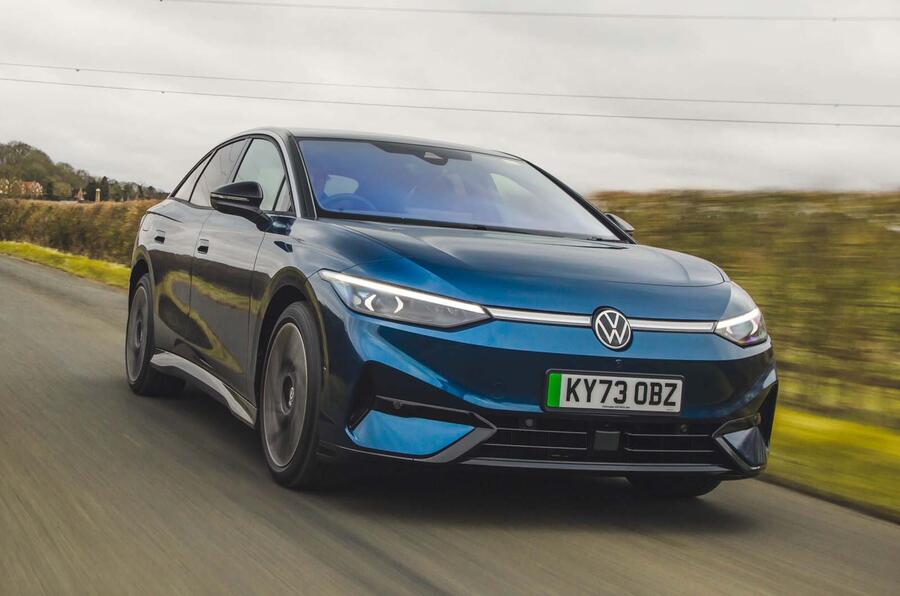So then, the new Volkswagen Passat eHybrid is a really good plug-in hybrid. It will do 73 miles on electric power at 3.6mpkWh, then carry on using its petrol engine while still doing over 50mpg a lot of the time, and it’s pretty hard to argue with that, right? Allow me…
I’m not about to dispute any of the findings of that test – because I wrote it – but in my view, the concept of a PHEV is fundamentally flawed. That new VW system is pretty remarkable and makes the Passat a very competitive PHEV. But even this one just seems like the worst of the electric and pure-ICE worlds.Â
Some people choose a PHEV as a company car to get the low BIK tax even though they can’t slow charge it while doing something else (like sleeping or working).
If that’s you, I don’t blame you, because that’s how our tax system operates at the moment (although it will become much less favourable to PHEVs from 2028).
But at that point, it’s a loophole rather than the right solution. After all, the mild-hybrid version of that Passat is several thousands cheaper, gets about the same fuel economy and is overall slightly more natural to drive.
The Passat can use DC rapid chargers, but those are so expensive that you would be better off just running it on petrol.
If you do have the ability to charge it regularly, then why not get a proper electric car? You’re going to be running the hybrid on the battery and electric motor most of the time anyway, while carting around a redundant engine.
In the case of the Passat, that means you have 108bhp at your disposal – adequate, but not exactly a near-£50,000 experience. Meanwhile, the Passat’s electric counterpart, the ID 7 Tourer, has more than double, at 282bhp.
I’m as partial as anyone to a flat six and a manual gearbox, but I’ve no love lost for a thrashy four-cylinder with an automatic – that’s just a means to an end.
With more power that’s smooth and silent to boot, as well as a more entertaining rear-drive chassis, the ID 7 is a better driving experience all round.
Ah, “but the range and the charging infrastructureâ€, you say. In our road test, we found the ID 7 will do a real 277 miles on the motorway, after which it will charge back up to 80% in less than half an hour.

The UK rapid-charging network has come on leaps and bounds in the last few years, largely thanks to Gridserve, and I find it extremely rare that rapid chargers at a motorway services are either not working or fully occupied.
They are expensive, but if you do most of your charging at home, the occasional rapid charge is not going to make the difference.
And if you are the rare person that regularly does over 300 miles a day, I reckon you should buy the mild hybrid, or even better: something with a diesel engine.
Nothing is currently stopping you and there are some great options: the Skoda Superb TDI is a five-star car.
Battery health is a concern as well. If your commute is 35 miles each way, and you can charge at home but not at work, you’re going to deep cycle the PHEV’s battery every day, which isn’t good for it, whereas you can keep the EV’s battery within the 20-80% sweet spot.
Not a concern if you lease a car for four years, but something to ponder nonetheless.
Sure, the ID 7 is more expensive to buy, but the difference is small enough that in the shifting sands of monthly rates, an option pack here or there could sway the balance either way.
The company car tax is even lower, and I’d argue that the superior driving experience of the EV makes up the difference. If you’re a private buyer, the PHEV really won’t make financial sense.
I’m not singling out Volkswagen here, by the way. The Passat and ID 7 are simply a convenient example, but much the same applies to a BMW i5 and 530e, a Hyundai Tucson and an Ioniq 5, and most other manufacturers that make a good EV.
If you’re after a company car, and you can charge at home but still suffer from range anxiety, I get it.
I can recommend the VW Passat eHybrid heartily. Just know you’re probably not getting the best car for the job.

